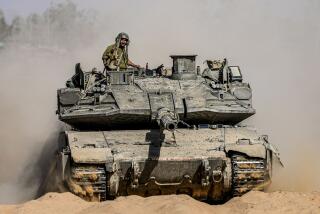Bush’s Military Views Reportedly Shifting
President-elect George W. Bush, who questioned the extent of the U.S. commitment in Europe during the campaign, sounded more cautious Monday about reducing the American military role there, according to a senior senator.
The report by Sen. Carl Levin (D-Mich.) and comments by other members of a bipartisan delegation of defense experts from the Senate and House suggest that as he comes face to face with the responsibilities of being commander in chief, Bush may be reluctant to make dramatic shifts in U.S. defense policy and spending priorities.
But he showed no inclination to step back from his support for a national missile defense program.
The meeting with approximately a dozen members of the House and Senate armed services committees and defense appropriations subcommittees--the legislators whose budget votes give them considerable authority over defense policy--offered the president-elect a firsthand look at the choices he must make if he tries to shift spending to beef up the military and give troops a pay raise estimated at 7%.
The conference also gave the legislators an opportunity to take the measure of the president-elect, who campaigned on a promise to change the way business is done in Washington.
Asked after the closed-door session whether Bush registered any surprise at what he heard, Levin said that “he’s recognizing the complexity of the numbers” that make up the approximately $309-billion defense budget.
And, Levin said, “I think he’s less committed to . . . making shifts in policy than he might have sounded during the campaign.”
Addressing the questions Bush raised during the campaign about whether the U.S. should play such a large peacekeeping role in the Balkans, Levin said the president-elect now sounded “a little more cautious.”
Sen. John W. Warner (R-Va.), who will be chairman of the Senate Armed Services Committee, said overseas troop deployments were discussed in the context of military morale problems and resulting difficulties in recruiting and retaining troops.
Missile Defense a ‘Sensitive Subject’
During a photo session as the meeting drew to a close, Bush acknowledged that national missile defense was “a sensitive subject for some members.”
“It’s a sensitive subject for leaders of different countries around the world,” Bush said. “On the other hand, I think it’s our obligation to do everything we can to protect America and our allies from the real threats of the 21st century.
“But the missile defense subject and the budgetary matters are all matters that require a lot of discussion and a lot of give-and-take and a lot of listening, and this was a good beginning,” he added.
Questions about the missile program are likely to be some of the earliest, and most difficult, defense policy matters Bush will address, involving not just budget decisions but issues that go to the heart of nuclear stability.
Critics say that because it could upset the nuclear balance, the creation of a missile defense system could set off a massive missile construction campaign in Russia and China. This is because those countries may be convinced that the only way they could restore the nuclear balance would be to increase their nuclear arsenals enough to overwhelm the defense system.
President Clinton left the decision to the next administration, saying more information on the feasibility of the project was necessary.
Bush said the group focused not so much on specific lines in near-term budgets, but on long-range policy and weapons systems that will be relevant to national defense two decades from now.
“I talked loud and clear about [how] a peaceful world really will depend upon our nation’s willingness to make a concerted effort to keep the peace, our nation’s effort to make sure that the men and women who wear our uniform are better paid and better housed and treated with the respect they deserve,” Bush said.
‘You’ve Been a Superb Listener’
Warner said it was the first time he could recall that a president-elect had sought out the views of congressional defense experts before inauguration.
“Defense has sort of been on the back burner . . . for many years,” Warner said to Bush during the photo session. “You’ve been a superb listener.”
Rep. C.W. Bill Young (R-Fla.) said Bush took “considerable” notes during the meeting.
Levin, the senior Democrat on the Senate armed services panel, said he hoped the meeting was a sign that defense issues would be addressed on a bipartisan basis.
More to Read
Start your day right
Sign up for Essential California for news, features and recommendations from the L.A. Times and beyond in your inbox six days a week.
You may occasionally receive promotional content from the Los Angeles Times.






